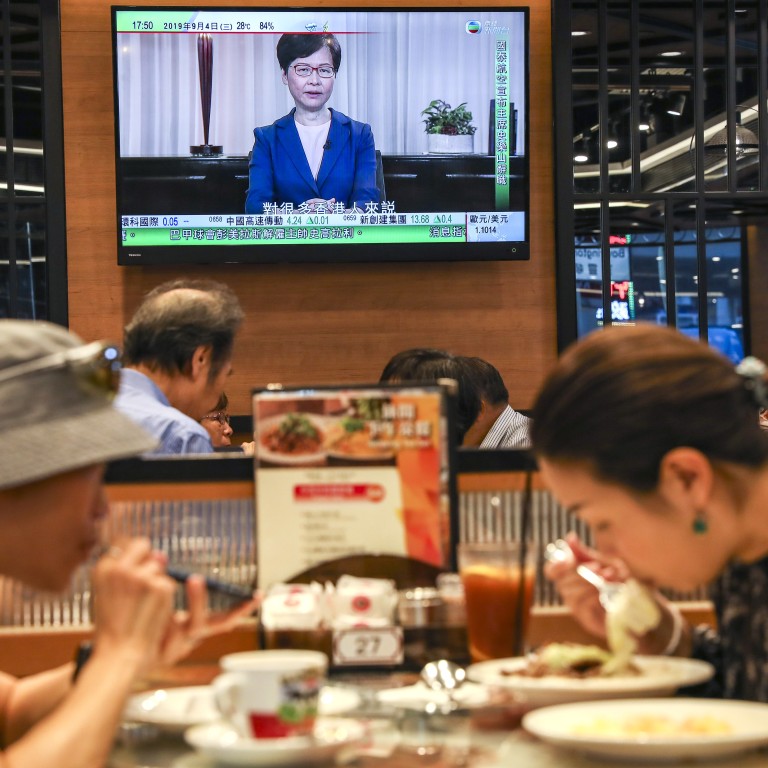
How Asia sees Carrie Lam’s withdrawal of Hong Kong extradition bill: ‘It’s welcome, but …’
- Protesters in Hong Kong may have been scathing about the chief executive’s attempt to appease the public; regional leaders have been a little more supportive
- But most welcomes have been both cautious and qualified
Initial hopes for a breakthrough following the climbdown by the city’s embattled chief executive, announced on Wednesday, were tempered when protesters derided it as like putting a “Band-Aid on rotting flesh” and vowed to continue demonstrating until she gives into the rest of their five demands. Their four remaining conditions are: withdrawing the characterisation of the protests as “riots”; amnesty for all protesters; an independent investigation into the police’s use of force; and universal suffrage.

But if protesters locally are largely displeased with Lam’s announcement – on Thursday she was even moved to hold a press conference to emphasise the decision was her own and not that of Beijing – some of her counterparts have given her announcement a cautious – but qualified – welcome.
In Australia, foreign affairs minister Marise Payne welcomed Lam’s announcement as a positive step in dealing with the concerns of protesters.
Hong Kong leader Carrie Lam announces formal withdrawal of the extradition bill
“We encourage any efforts to resolve the situation in Hong Kong peacefully,” she told local press on Thursday. “We continue to urge further efforts to de-escalate, establish dialogue and commit to negotiation as a basis for a lasting resolution.”
On Twitter, the former prime minister of New Zealand Helen Clark echoed some of the protesters’ criticisms, but also credited Lam for taking the first step.
“Surely the old adages of ‘better late than never’ but also ‘better never late’ apply to the welcome announcement of Hong Kong leader Carrie Lam that the extradition bill will be withdrawn: #HongKong could have been spared three months of turmoil. Just saying.”
Carrie Lam’s withdrawal of extradition bill draws more scepticism than hope
“We hope the situation in Hong Kong will be settled smoothly and peacefully so that Hong Kong’s prosperity and development can continue,” a spokesman said.
Meanwhile, Korea’s youth-led “Future” or mirae party, which supported a protest in Seoul last weekend held by a group of Hong Kong students in the country, said they would continue to support protesters in all five of their demands.
“We believe that the withdrawal is already an achievement, made possible through the united efforts of the citizens of Hong Kong, throughout generations,” they told the South China Morning Post.
“We sincerely hope that the five demands of the Hong Kong citizens will be accepted.”
“China, an authoritarian state, allowed Hong Kong to protest and finally accepted demands of the people respecting their autonomy,” he tweeted. “India, a democracy, took away whatever limited autonomy Kashmir had and has put Kashmiris in virtual house arrest for a month!”
“[It] is welcome news, but much more must be done to fully realise the legitimate aspirations of the Hong Kong people, as guaranteed under ‘one country, two systems’. The people of Hong Kong deserve the future of justice, real autonomy and freedom from fear that they were promised, and for which they have long been courageously fighting,” she said.
“The pro-Beijing leadership in Hong Kong must ensure a political system accountable to the people, including granting universal suffrage and investigating police violence. The escalating violence and use of force perpetrated by the Hong Kong authorities against their own people in recent weeks, which has led to tragic loss of life, must end now.”
On Twitter, Democrat senator Chuck Schumer said: “We continue to stand with the people of Hong Kong as they exercise their democratic rights. The withdrawal of Beijing’s extradition bill is long overdue.”

